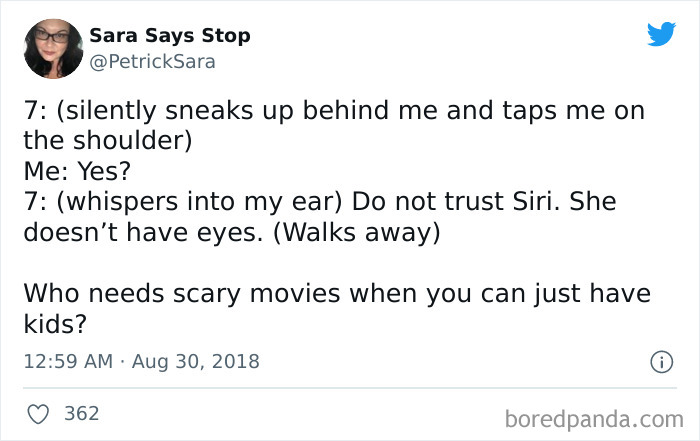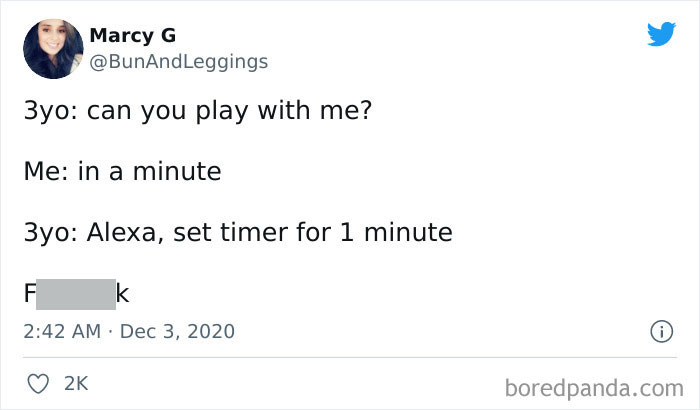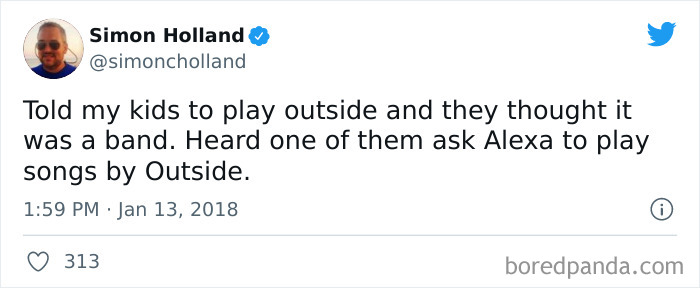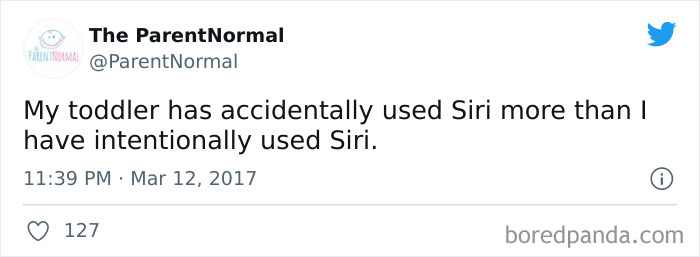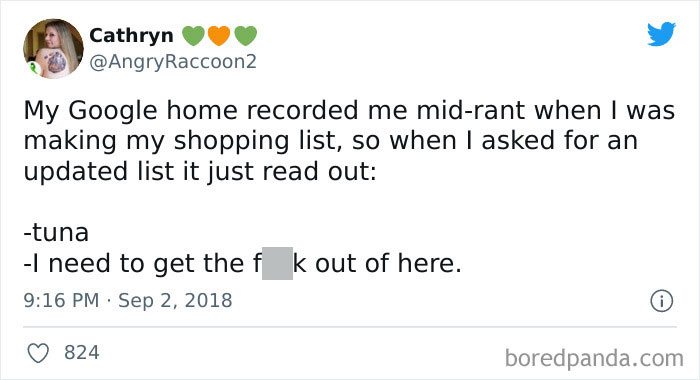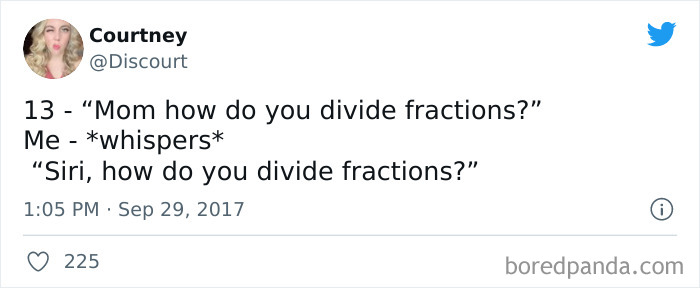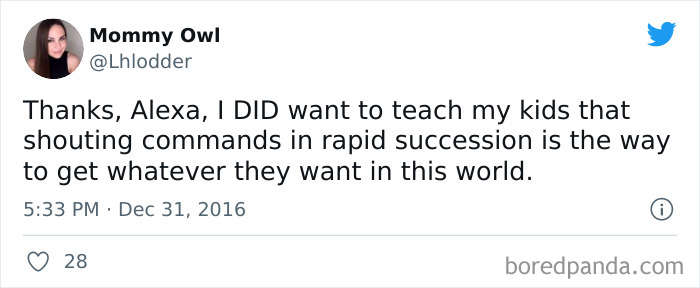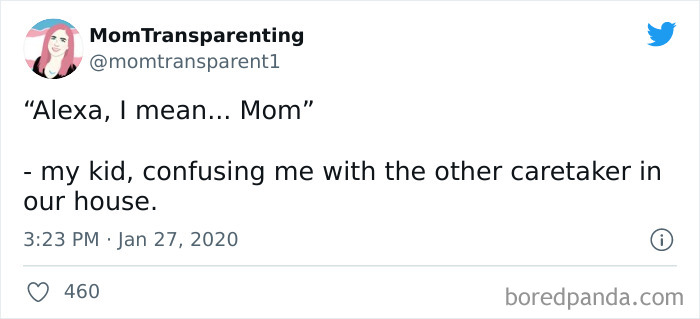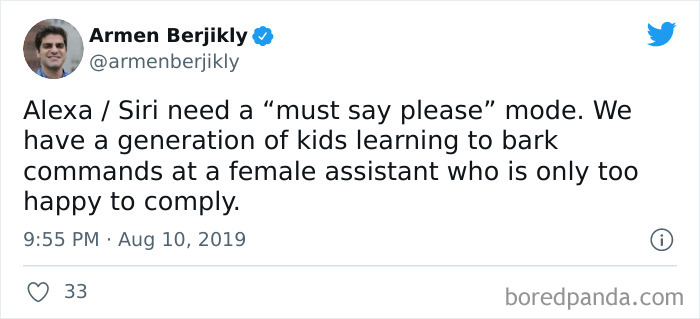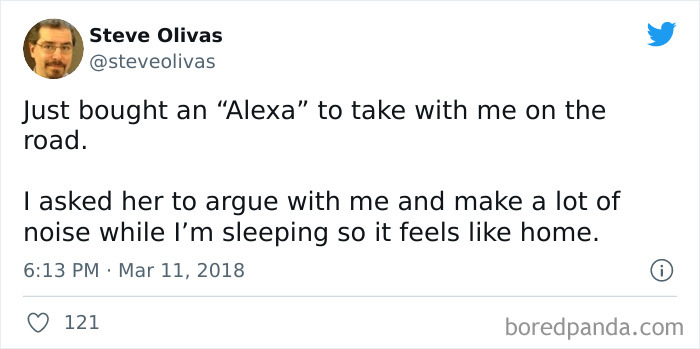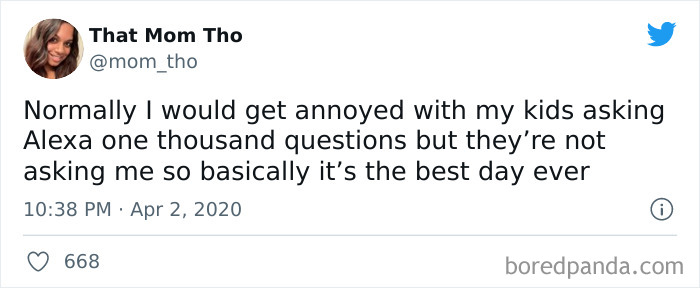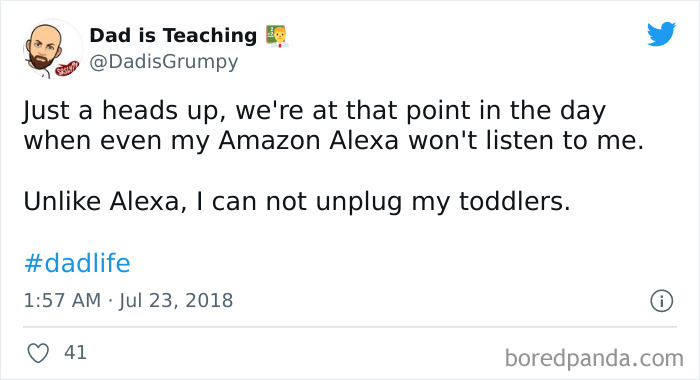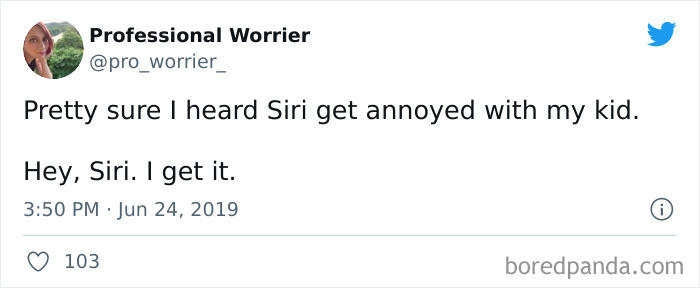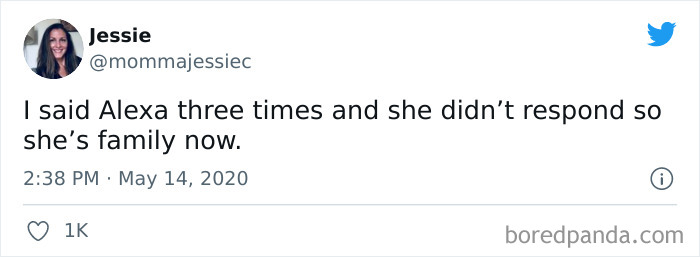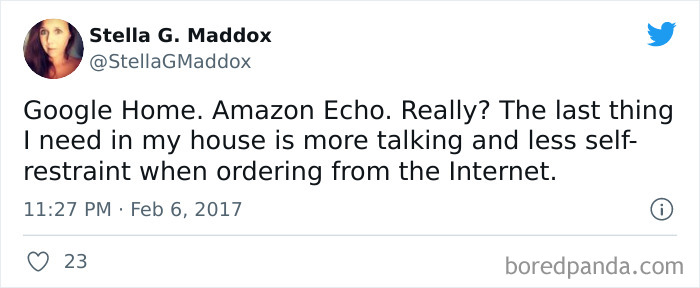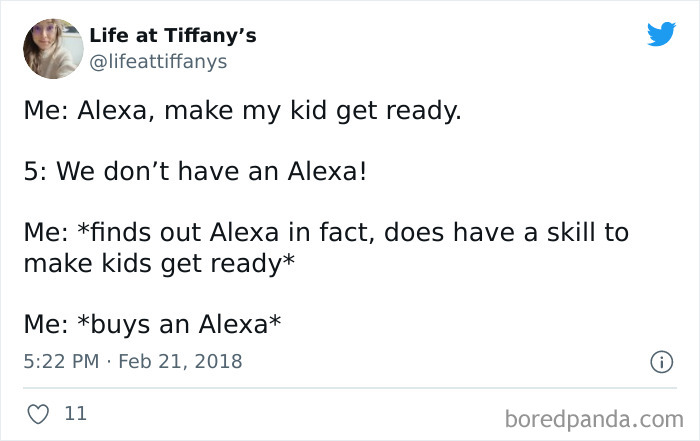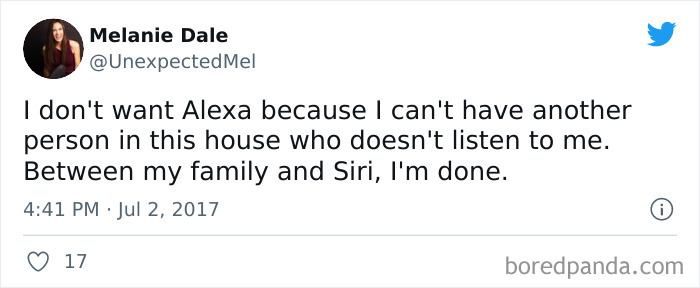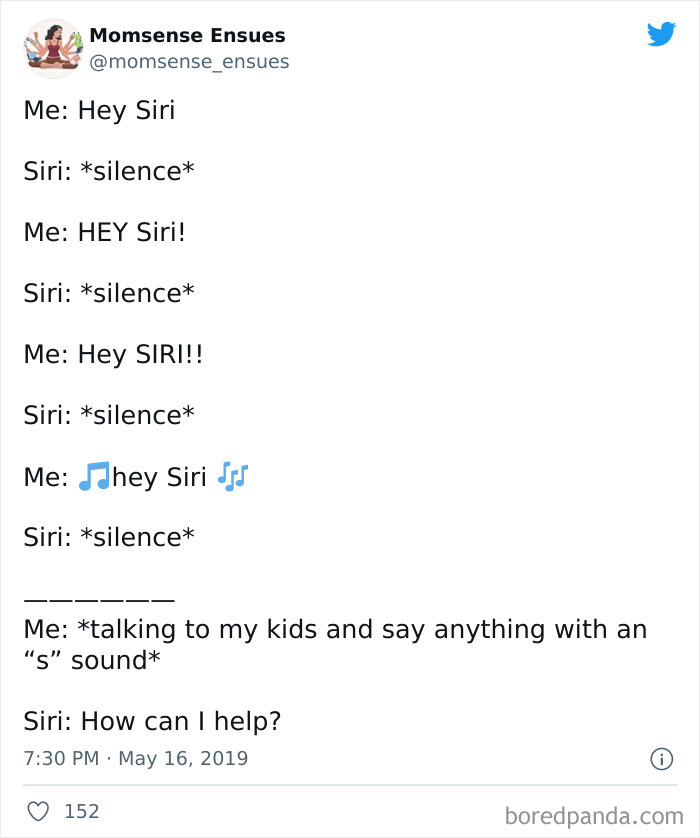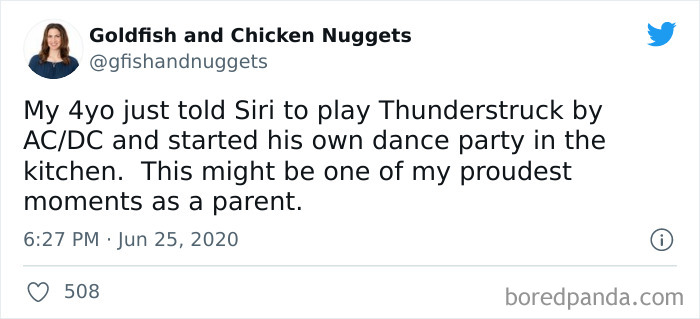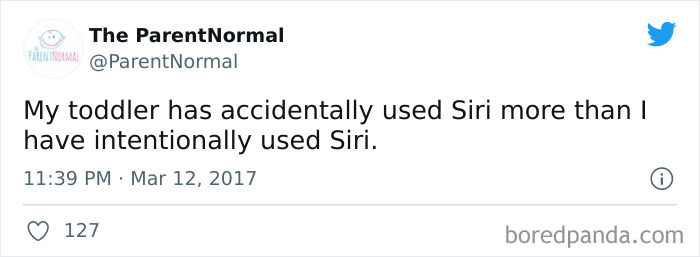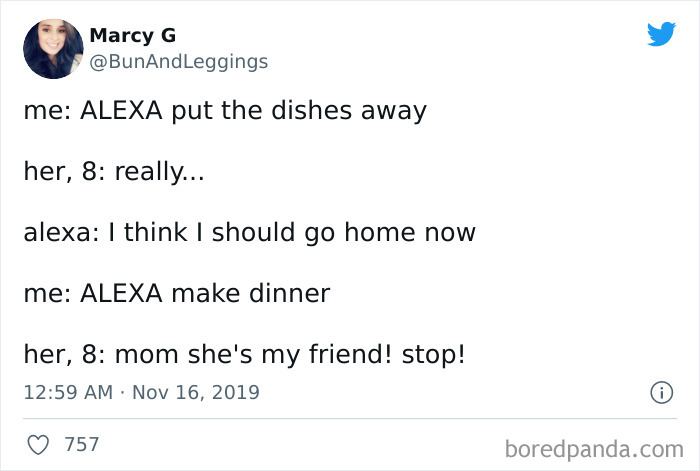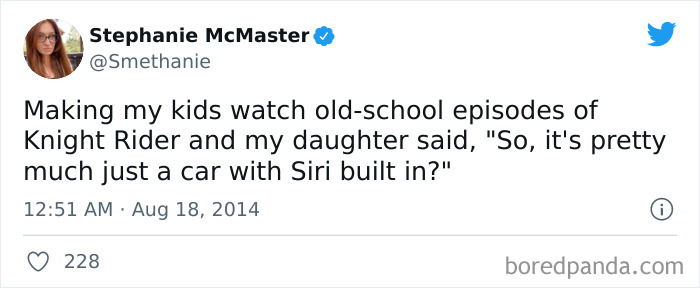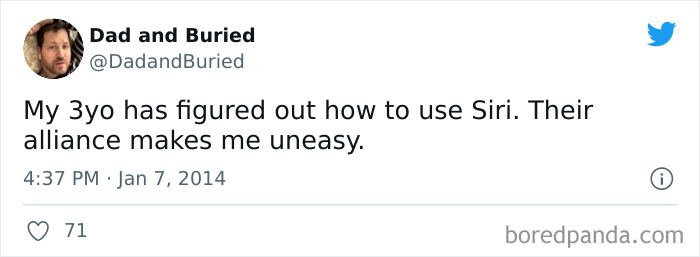Raising your kids while they are surrounded by tons of technology every single day can be a very peculiar experience. Especially if you use virtual/artificial intelligence assistants at home, like Alexa from Amazon or Siri from Apple.
Kids can quickly start relying on them as authority figures that sometimes have more knowledge than their parents, leading to some pretty hilarious (and low-key dystopian and troubling) situations. However, let’s not spoil too much for you, Pandas. Bored Panda has collected some of the funniest tweets about what it’s like to be a parent in the age when Alexa, Siri, and other AI assistants are becoming ever more deeply entrenched in our homes and daily lives.
Don’t forget to upvote the tweets that you enjoyed the most. Meanwhile, if you’re a parent or if you use an AI assistant, we’d love to hear your thoughts on the over-reliance on tech at home.
Bored Panda reached out to writer and parenting blogger Molly DeFrank, who helps parents navigate tech in the home, and had a chat with her about when we should get worried about our kids relying on tech, screens, and the internet too much, what we can do to balance things out, and why it’s important to have firm boundaries. You’ll find Molly’s fantastic insights below, so be sure to read on, Pandas.
This post may include affiliate links.
Blogger Molly shared some warning signs that it might be time to get worried that our kids are spending far too much time in front of screens and using tech. “When parents see amped-up sibling spats, if screen time ends and your child falls apart, if your child complains of boredom when screens aren’t an option: these are all good indicators that your kids might be ready for a screen break,” she noted. “The bad news is that kids are spending seven hours per day on digital entertainment. This is not good for our kids.”
However, Molly also stressed that there’s some good news, too. Parents are “in the driver’s seat” and call the shots when it comes to tech use. “We get to decide how much and what kind of tech to allow in our homes. If the screen time status quo isn’t working in your house, confidently make a change,” she told Bored Panda.
I was curious to find out about how to balance tech use timewise, so Molly shared what works in her family. “During the week, we only use digital entertainment after dinner, and we use it together. We’ll watch a family show or movie, but not every night. Other nights we play board games, card games, or baseball or football outside. We have six kids, ages 12 and under. None of our kids have phones. Certainly, this plan isn’t ideal for every family, but eliminating daily video gaming/tablets has transformed the culture of our home in the best way,” the parenting expert explained how her family limits tech use.
Molly said that parents ought to ask themselves a simple question: “If our kids only have two or three hours of unstructured time at the end of a school day, how much of that time do we want them consuming entertainment?” The answer to that should then help parents structure how their children spend their free time.
The blogger was frank that tech can have negative, not just positive, effects on children. “Our family loves technology, but too much of it was bringing out the worst in our kids,” she said (and many of us can relate). “Putting tech in its proper place in your home will require a little trial and error. But allowing kids to develop skills and habits outside of the digital world will repay dividends for their mental, emotional and social wellbeing. (Interesting that many tech giants are some of the most screen-restrictive parents!)”
In Molly’s opinion, the best way to limit tech use while avoiding tantrums is to “relegate it to specific days and windows of time.” If everyone knows the rules beforehand, it’s easier to follow them. “In our house, we don’t isolate and consume digital entertainment. If the kids only get a half-hour or an hour of video games per week, and it’s always on Sundays, they won’t even ask for it on the other days. It’s not even an option,” she gave an example of how this works in practice.
“Good parents can have different screen time plans that suit their unique family. But whatever that plan is, create firm boundaries. In the long-term, you’ll find that your kids turn their boredom into opportunity. We also need to ditch the idea that our job is to entertain our kids. We are not cruise ship directors, we are parents. Guide, help, love, nurture, cultivate, equip, mentor? Yes. Entertain? No.”
Naturally, some parents might be a tad lost as to thinking up some alternatives for kids to do or they might not be sure of how to introduce them into their children’s lives. Parenting blogger Molly suggested trying a tech fast. What this means is having zero digital entertainment for your kids for a whole two weeks.
“Invite them to sit with you and create a list of fun activities to try during the fast. Go for a walk. Ride bikes. Play a board game. Write a letter. Write a story. Do a puzzle. Roll up your sleeves to get them started, then watch where they gravitate when they have free time. Feed those interests. Budding artist? Grab some new colored pencils and a fresh sketch pad. Potential bookworm? Head to the library. Building enthusiast? Grab some Lego. Feed their interests and talents and watch your amazing kids blossom!” Molly listed some fantastic activities that kids can do. And if I know parents, they’ll be excited to join (especially when it comes to Lego).
Unfortunately, an increasing number of people named Alexa end up being made fun of at school due to having the same name as Amazon’s AI assistant. “This is causing problems for people named Alexa, who are frequently on the receiving end of repeated jokes, where people shout their name and issue a command,” the BBC writes.
Though there are alternative words to ‘wake up’ the assistant available, the original, Alexa, seems to have become a household name that won’t be going the way of the dodo any time soon.
Technology addiction is no joke. Compulsively using tech and the internet can impact your daily life to the point that you prioritize the addiction over family, friends, health, and everything else that’s most important.
Even if they’re not at addiction status yet, the habits that we pick up as kids can be hard to root out later on when we’re surrounded by smartphones, tablets, laptops, consoles, TVs, and smart home tech every step of the way. The tech… becomes so ingrained in your daily life that it’s hard to know what to do if there’s ever a power outage. (My personal go-to’s are tabletop games and reading books in the candlelight.)
A while back, Bored Panda reached out to parenting blogger Molly and Dr. Liz Donner to speak about tech-reliance, tech-detoxes, and limiting the time that kids spend in front of a screen. In this day and age, it’s become incredibly easy to rely on technology to keep our kids busy so that parents might get some time to themselves. However, it’s this ease that’s actually a hidden danger.
“It’s so easy to hand your kid an iPad or flip on a show when you want a few minutes to yourself. But parents are in a unique position right now, because screens were never as accessible to kids as they are today,” Molly explained to Bored Panda earlier.
“We have kind of a long-term uncontrolled social experiment going on with our kids. It’s hard to blame parents when this technology is available and easy. But at some point you have to stop and ask yourself, is this the best way for our home to operate? Ultimately we decided it wasn’t so we made a change,” Molly explained that she decided to limit screen time for her kids.
According to the parenting blogger, there are some truly huge benefits that come from restricting access to screens and tech. “I can’t emphasize the benefits enough. I’ve started to more clearly see our kids’ talents and interests. They are taking the time to pursue those interests since they have a lot more time,” she said.
“My daughter reads faster than we can check out books. She writes stories. My son draws pictures and even initiated a family drawing night in which he was the instructor. It’s good for kids to be bored sometimes so they can take initiative and create. I read the Tech Wise Family By Andy Crouch and he said in their family, they aim to create more than they consume. I loved that principle. I’m starting to see the benefits,” Molly shared with Bored Panda how things in her family changed when she began limiting the time that her kids spend in front of screens.
Molly also shared some awesome book recommendations for kids to help provide an alternative to screens. “My daughter loves Max Einstein by James Patterson. I hosted a little book club for my daughter and a few friends and they read Best Family Ever by Karen Kingsbury. I also introduced her to some of my favorite books as a kid, including the Babysitter’s Club series. My boys love graphic novels. We got my older son the Action Bible which he can’t put down. Homeschool moms make my favorite book lists, I especially love readaloudrevival.com, she has amazing book lists. Technology can be a great tool, but we just want to make sure that in our house, we are using the technology, rather than being enslaved to it.”
Meanwhile, Dr. Donner told Bored Panda that the biggest challenge that comes with limiting screen and tech time for kids is finding other activities to replace them with. “A screen is very captivating and can keep a child entertained for hours while their parents are busy getting other things done,” she said.
“Many parents allow free reign because they feel that the screen is harmless or even educational for their child’s developing brain. Limiting screen time increases the amount of valuable real-life skill development. Kids require actual human interaction to enhance their social skills and even motor development. They need to learn to understand real human facial expression, body language, tone of voice, and reciprocal communication skills,” Dr. Donner explained.
“Screen-free interaction with your children doesn’t have to be anything fancy. Reading a book to them as early as at 6 months of age has shown to increase their language and reading skills later in life. Hands-on play time will teach them social interaction and motor skills that are essential to their healthy development. Lastly, we find that less screen time in the toddler years corresponds to lower rates of ADHD by the age of 7.”

Add Your Photo To This List
Please use high-res photos without watermarks
Upload Photo
Ooops! Your image is too large, maximum file size is 8 MB.
Publish
Source link : https://www.boredpanda.com/alexa-siri-funny-parenting-tweets/

